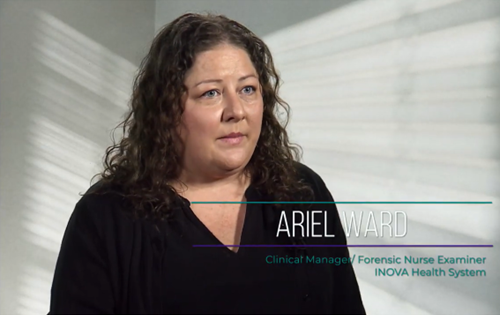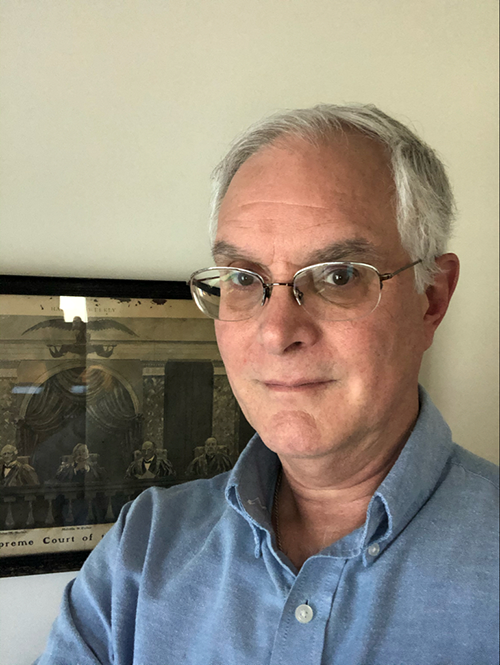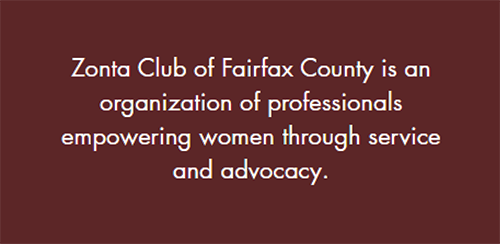
Welcome to the 2023 January issue of Volunteer Voices, a monthly newsletter for current and potential Domestic and Sexual Violence Services (DSVS) volunteers.
In this Issue:
| Table of Contents | |
|---|---|
|
|
Hello, DSVS Volunteers!
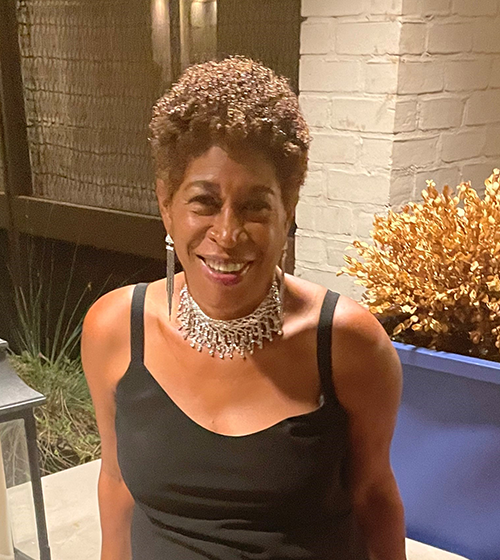 Hi, my name is Renee Carroll-Grate. I joined Fairfax County’s Department of Family Services, Domestic and Sexual Violence Services, in August 2022. While I am a new employee as a victim advocate at DVAC, my passion for working with victims of domestic abuse and sexual assault began when there were limited protective laws, scarce government funding, and an abundance of societal attitudes about the issues that needed to be reshaped. Since that time, I have served in various advocacy roles, and my passion and commitment to advocate against gender-based violence have strengthened. The highlight and joy of my advocacy career was the opportunity to serve as executive director for the Cayman Islands Crisis Center, located on Grand Cayman Island, from 2008–2012. As you can imagine, the work was difficult and emotionally draining. However, the combination of the optics of the crystal blue sea and beaches glistening with beautiful white sand gave me serenity and peace. As I continue my professional journey of working to advocate against violence against women, I am delighted to be a part of DSVS. I am excited to be a part of a program designed to help individuals who have been confronted with interpersonal violence access victim services at Fairfax County General District Court.
Hi, my name is Renee Carroll-Grate. I joined Fairfax County’s Department of Family Services, Domestic and Sexual Violence Services, in August 2022. While I am a new employee as a victim advocate at DVAC, my passion for working with victims of domestic abuse and sexual assault began when there were limited protective laws, scarce government funding, and an abundance of societal attitudes about the issues that needed to be reshaped. Since that time, I have served in various advocacy roles, and my passion and commitment to advocate against gender-based violence have strengthened. The highlight and joy of my advocacy career was the opportunity to serve as executive director for the Cayman Islands Crisis Center, located on Grand Cayman Island, from 2008–2012. As you can imagine, the work was difficult and emotionally draining. However, the combination of the optics of the crystal blue sea and beaches glistening with beautiful white sand gave me serenity and peace. As I continue my professional journey of working to advocate against violence against women, I am delighted to be a part of DSVS. I am excited to be a part of a program designed to help individuals who have been confronted with interpersonal violence access victim services at Fairfax County General District Court.
Renee Carroll-Grate
Victim Advocate, Domestic Violence Action Center

Self-care and music therapy are partners, as music has also been proved to provide similar benefits, including relaxation, reduced anxiety, and mindfulness. Since our individual playlists are as unique as our fingerprints, music can be a personalized form of therapy. Learn more about creating a self-care playlist.
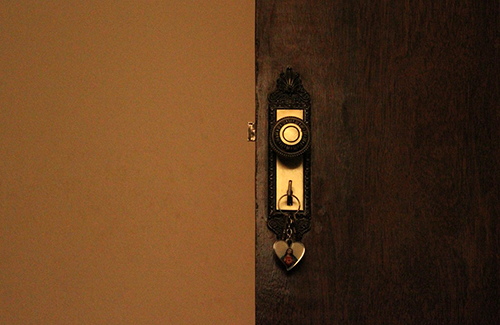
As CEO and President of the National Coalition Against Domestic Violence, Ruth M. Glenn has spent years advocating for survivors of domestic violence at every level, from planning prevention strategies to responding in moments of crisis. In her new book, Everything I Never Dreamed: My Life Surviving and Standing Up to Domestic Violence, she shares some of her own story as a survivor as well as what she has learned from decades of working in the field. Here, she answered a few questions about how family, friends, and communities can support survivors of domestic violence, both during and after abuse—and about the importance of continuing to openly discuss domestic violence, even in a society that remains uncomfortable with that conversation.
This interview has been edited for length and clarity.
Corinne Segal: I wanted to start by asking if you can speak to some of the difficulties of knowing someone who is being abused. Why is it sometimes so challenging for people to know how to respond?
Ruth M. Glenn: First of all, we still live in a society in which domestic violence is a taboo subject. We choose to either ignore it or be in denial or even, quite frankly, don’t know how to approach it even when we suspect it. Secondly, we are still living in a society that for some reason still holds women who are most frequently the subjects of domestic violence at a lower class, a marginalized group.
And then the third [thing] is, we’re human beings. And even if we were to feel comfortable saying something, all of the things that we would want to say would not be helpful, because as human beings we want to fix it—we want to make it go away—and so the things that we might say are “get out” or “I have a room in my basement” or those types of things. And those are not always, and in fact most of the time are not, what victims of domestic violence need.
CS: What are some signs that someone might be in a relationship where they are being abused?
RG: Some of them are obvious, which are physical marks and physical signs, such as bruising or black eyes. Unfortunately, as a society, that’s also the first thing we look for, rather than more subtle signs, which are being very aware that someone has all of a sudden stopped communicating. If you’re a family member, all of a sudden you’re not hearing from Ruth as often, or the partner is monitoring the calls. Or: How come Ruth is not at the family barbecue? And why is it that at Christmas they only come over for an hour?
All of those types of things. Their personality has changed. Particularly the victim’s personality has changed—has probably become more withdrawn, more acquiescent to their partner in the relationship. They may have been someone who worked before and now no longer works and says, “Well, my partner says I don’t have to.” One of the things that I talk about in particular is the lack of access to their own financial resources. So the list kind of goes on and on and on, but more so around the not-so-overt signs. [The perpetrator] will do everything [they] can to keep that person from being visible and present.
CS: Say that someone suspects that someone they care about is being abused, but the victim is not able to leave, for any number of reasons. What can that person—or in general, a community—do, at that point? How can they support someone from outside the relationship?
RG: I think there are plenty of things that we can do. The first and foremost is acknowledging with that person that you know something’s not right. You don’t have to name it. You can just say something as simple as, “Ruth, I just feel like something’s not quite right. You don’t have to say anything. I don’t expect a response. But I want you to know that I am here for you when and if you ever want to talk about it, or if there is a need to talk about it.”
Always, after saying that, make sure that you have resources and information for that person, should they come forward and say, “You know, Corinne, I would love to talk to you about what’s happening because I’m so lost.” And you would be able to provide the domestic violence hotline number, you would be able to provide other resources and the number and location for the Community Domestic Violence Program, walking through with them about a safety plan.
Maybe they’re not ready to call the hotline, but you say, “OK, well, what else can I do for you? Would it help if you and I talked about some kind of safety measure or safety plan? If I’m your neighbor and your porch light is out when it should be on, or you blink it three times, should I call the police? Do you want to pack the toiletry bag and a copy of your birth certificate and keep it at my house?”
There’s myriad ways, depending on your station in that person’s life and how comfortable you feel talking to that person in it. If you’re a coworker: “Do you need me to walk you to your car? I can tell you’re not quite comfortable today, do you need me to walk you to your car?” Always being very thoughtful, and of course not putting yourself in a dangerous position. I would like to remind us that while we’re trying to make sure that someone else is feeling supported and safe, we also have to watch out for our own. Abusive persons can be quite volatile when they feel like they’ve lost control.
Just always be prepared that if you open the door, that they can rely on you, to provide them with a minimal of what they need.
CS: It sounds like there are so many different ways to simply be very present—to not disappear on that person.
RG: Correct. And they are not going to do the things that seem rational. They’re just not. They have too much to think about. They have too much to work through. I don’t know how many times I heard, “I would have just left.” Well, that’s easy for you to say. … Please understand that they are probably being as rational as they can be.
CS: Can you speak to some of the ways that a community can support a survivor after they do leave? And also, what are some of the common mistakes that you see people make?
RG: It’s less helpful to be supportive, and then, once they’ve left, you feel like your work is done. It’s not. Once they’ve left, if we think that the abusive person has given up, we’re sadly mistaken. And if the victim has been left to now fend for herself, the ability for that abusive person to worm their way back in is pretty strong. And it’s not the fault of the victim. It’s like, Well, now I’m out here and I don’t know what else to do.
I’m not saying by any stretch of the imagination to handhold—just to make sure we’re clear about what we can and cannot provide support with. And if this is where I have reached my max on the support that I can provide, I have these other avenues for you.
Victims who have left, and left safely, need to know that this society is okay talking about domestic violence. Too often we’re in rooms where that is not a subject that’s discussed. If I’m a survivor I need to feel like I have a place here, and that we can talk about it. … I can’t tell you how many times I’ve told my story over the years and had survivors say, “Oh my God, I can finally talk about it.” In various ways, of course—not all of them said it exactly that way—but the relief they feel, to know they’re not alone and they can talk about it, really puts them in a different place in their survivorship and their ability to move through this.
We live in a society that, because it doesn’t recognize domestic violence in the appropriate ways, the work that needs to be done—particularly on the prevention side—is terribly under-resourced. We want to make a world in which domestic violence doesn’t exist. … It takes more than talking about healthy relationships in a classroom setting for, you know, [grades] six through 12. It just does. It really has to be a much broader, greater strategy that we’re all willing to take a look at and say, in the year 2050, we will have implemented these great prevention strategies for [everyone] that helps us understand that someone treats you badly, no matter whether they’re your partner or not, does not respect you. And that’s the first place to start.
CS: Going back to what you were saying about the importance of providing space for survivors to talk about their experiences: a lot of people just don’t know what to say to someone who has been abused, especially if the person who’s disclosing to them is maybe not that close to them. Maybe they are a coworker or a friendly acquaintance or someone they haven’t seen in a while. I’m wondering if there’s any language that you could offer to people for when someone discloses that they are a survivor.
RG: My suggestion is to empower that person to teach you. … It’s a perfect opportunity for you to get educated and say, “Help me understand. I’ve never experienced that, I don’t think,” or, you know, “Is it what my mom experienced? And this is what happened to her—was it physical, emotional? Help me understand what your experience was, because I want to know better.” And I think that that opens up a wonderful [conversation] if you are prepared to hear it.
This interview has been republished from LitHub.
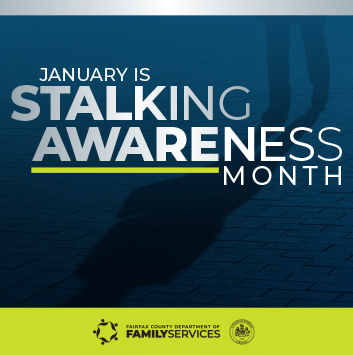
Stalking:
- is repeated and unwanted contact that makes you feel afraid or harassed.
- is serious, often violent, and can escalate over time.
- is common. About 1 in 6 women and 1 in 17 men have experienced stalking in their lifetime.
- is pervasive. 81% of women who were stalked by a current or former husband or cohabitating partner were physically assaulted by that partner; 31% of women were sexually assaulted.
- is a crime in all 50 states and the District of Columbia.
- is a crime that happens across all ages and genders, though people aged 18 to 24 have the highest rate of stalking victimization.
- is a crime with financial repercussions. 1 in 8 stalking victims has reported losing work because of the stalking. More than half of these victims reported losing five or more work days.
- starts early. Nearly 54% of female victims and 41% of males victims experienced stalking before the age of 25.
Learn more about how to recognize and take action against this crime.
TED Talk: I Was Human Trafficked for 10 Years. We Can Do More to Stop It
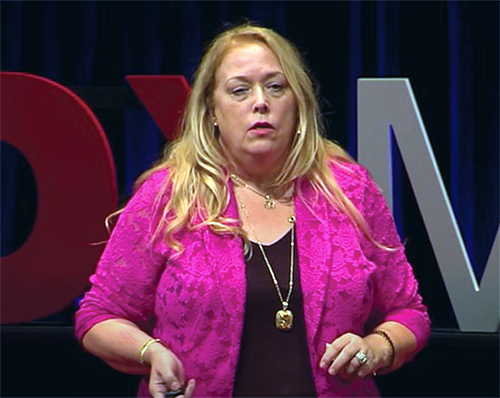 Barbara Amaya ran away at the age of 12 after being abused by family members. She was taken in on the streets of Washington, D.C., by a couple who seemed nice, but who ended up selling her into human trafficking. She was used for months, and then sold to a man named Moses, who took her to New York and continued to traffic her for many years. Now Barbara fights for other victims of human trafficking and to change policies that treat victims as criminals. Barbara is an anti-trafficking advocate, speaker, trainer, author, and survivor-leader in the movement to end modern-day slavery and human trafficking and has been actively raising awareness of the sexual exploitation of children and domestic sex trafficking since 2012. She shares her story in this TED Talk.
Barbara Amaya ran away at the age of 12 after being abused by family members. She was taken in on the streets of Washington, D.C., by a couple who seemed nice, but who ended up selling her into human trafficking. She was used for months, and then sold to a man named Moses, who took her to New York and continued to traffic her for many years. Now Barbara fights for other victims of human trafficking and to change policies that treat victims as criminals. Barbara is an anti-trafficking advocate, speaker, trainer, author, and survivor-leader in the movement to end modern-day slavery and human trafficking and has been actively raising awareness of the sexual exploitation of children and domestic sex trafficking since 2012. She shares her story in this TED Talk.
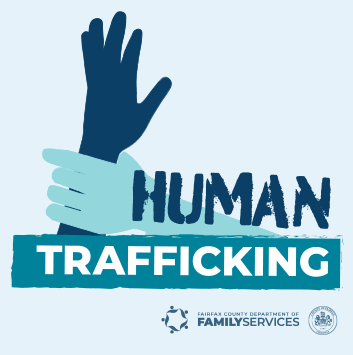
Human trafficking is the control and exploitation of another person's labor or commercial sex work by force, fraud, or coercion. Forcing someone to engage in commercial sex work against their will is a form of sexual violence. Commercial sexual exploitation includes using force, fraud, or coercion to facilitate the exchange of sex acts for anything of value, including money, drugs, or basic needs such as food, clothing, or shelter. Get more information about the dynamics of human trafficking.
 “There is no better exercise for your heart than reaching down and helping to lift someone up.” –Bernard Meltzer
“There is no better exercise for your heart than reaching down and helping to lift someone up.” –Bernard Meltzer
Volunteers who attended the December quarterly training—a discussion about self-care led by ADAPT’s Jennifer Kaplan-Perkins—had their emotional tanks and their bodies nourished. Each volunteer received a tote bag that included a water bottle, a stress ball, a gift card from Nothing Bundt cakes, a thank you note and self-care kits.


